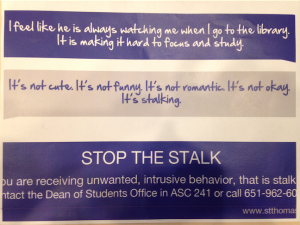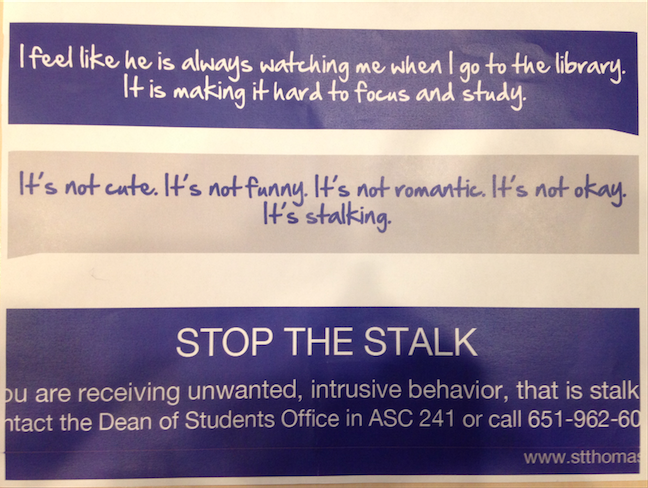With changes in federal regulations and the efforts of the Dean of Students office and student groups, St. Thomas has a new sexual misconduct policy that includes information on stalking, relationship violence and consent.
Dean of Students Karen Lange and Interim Associate Dean of Students Rachel Harris said the biggest changes to the new policy focus on stalking, dating violence, sexual coercion and exploitation. The university also clarified the official procedure when it comes to investigating sexual misconduct.
“Those are things that were sort of handled by the policy before, but … they weren’t specifically called out and defined,” Harris said. “This gives a much better definition of stalking and dating violence, which is physical violence in a relationship; exploitation, which is things like maybe taking pictures of somebody kissing or having sex and posting them on Facebook or social media; and coercion, which is sort of undue pressure … to do sexual behavior.”
The policy also includes what the process of reporting sexual misconduct will entail. Previously, survivors of assaults and other sexual misconduct could choose between a “formal” and “informal” process. Under the new policy, students can still choose between a formal and informal process, but Harris said the options are laid out in a much clearer and more transparent manner.

“The process, especially if you read it, is much more clear in terms of what victim’s choices are in terms of an informal or formal process,” Harris said. “One of (Lange’s) goals in helping kind of lead this is to make sure we’re very transparent so that students, faculty and staff know exactly what will happen.”
During a formal investigation, a Title IX investigator would take a complaint from a survivor and identify what other evidence or information is needed. The investigator would then take a statement from the perpetrator and from any witnesses who may have information. The most serious consequences of a formal investigation were probation, suspension or expulsion of the perpetrator from St. Thomas.
During the informal process the survivor would receive any assistance required without a formal investigation.
Previously, designated investigators with St. Thomas would gather information about incidents of sexual misconduct. Now, staff members who have been trained as “fact finders” will conduct investigations. Those trained over the summer include members of the Student Affairs and Human Resources departments, the School of Law, the College of Business, International Student Services, Student Diversity and Inclusion Services, Student Engagement and the Dean of Students office.
In addition to fact-finder trainings, every member of St. Thomas’ faculty and staff is expected to go through training on the new sexual misconduct policy.
“The whole university is taking leadership on this with faculty and staff,” Lange said. “It’s not only training for themselves for if they are in a situation like that, but it’s also training in how do you work with students.”
According to the new policy, any faculty or staff member – with the exception of those working in Health Services and Counseling and Psychological Services – who is made aware of an instance of sexual misconduct is required to bring that information to a “responsible manager.” If students are involved in the incident, the responsible manager would be someone in the Dean of Students office. Despite this change, survivors of assaults will still have the power to choose how the situation is handled.
“It doesn’t mean when a faculty member calls … and says, ‘Hey, this student just told me they were assaulted’ … it doesn’t mean we’re going to launch this huge investigation,” Harris said. “What it means is that we want to try and identify how we can help that student.”
Incoming first-year students, international students and transfer students have also received training in the new policy, and the Dean of Students office is working to organize trainings for upperclassmen as well. Included in those training sessions is an emphasis on St. Thomas’ bystander intervention program Green Dot, which encourages students to step in when they see a potentially harmful or violent situation.
“Part of what we try and communicate with all of our students, graduate students, upper class students and first-year students is that St. Thomas is a community that cares and that we really expect students to pay attention to what’s going on,” Harris said. “We spent a lot of time talking about how you can do that.”
Freshman Brady Anderson, who attended the training for first-year students, said he is glad the university has updated its policy to comply with federal regulations.
“I just think it’s good to promote safety around the campus,” Anderson said. “I mean it’s good that we’re always following federal regulations.”
Lange said the new policy, which was adopted in June, had been in the works for some time.
“We started updating our policy before the federal regulations came out because we knew it was time,” Lange said. “The Dean of Students and the whole administration really is concerned about student safety, and sexual violence is one of those pieces.”
The Dean of Students office plans to partner with St. Thomas student organization FemCom to work on improving sexual misconduct trainings and other similar initiatives. Seniors Madelyn Larsin and Morgan Schreurs and sophomore Shannon Twiss, three of the four co-facilitators of FemCom, said they think the new policy is a step forward but still needs work.
Among the issues FemCom believes the policy has are the definitions of consent and the lack of the word “rape” when describing instances of sexual violence.
“We are really pleased with their list of things that consent is not, but we think it’s missing what consent is,” Twiss said.
Twiss, Schreurs and Larsin said they support beginning the consent section of the policy with an affirmative definition of what consent is, rather than a list of what it is not. FemCom’s definition of consent is a “sober, verbal, continuous and enthusiastic yes.”
Schreurs also expressed concern over the policy’s language in describing sexual assault. The policy refers to “non-consensual sexual intercourse.” Schreurs said she believes that phrase should be replaced with the word “rape.”
“FemCom is very against this framing of language because what it really should say as a heading there – and then go into the definition of – is rape,” Schreurs said. “It’s a misnomer, it’s an oxymoron. If something is non-consensual, it is not sexual intercourse, it is violence.”
FemCom met with members of the Dean of Students office Sept. 5 to discuss their concerns. Lange said FemCom’s criticisms were welcomed.
“We appreciated their insights and welcomed their input and suggestions,” Lange said. “As we continue to follow the federal regulations and receive input from our campus community, we will review and make changes as deemed appropriate.”
Lange and Harris said the Dean of Students office plans to continue working with FemCom to fine-tune the policy and ensure students’ safety, on or off campus.
“That’s probably the number one reason why we spent as much time as we did, both revising the policy and all this time on training and prevention and education for students,” Harris said. “We want students to graduate, we want students to have a great education and the greatest experience here, and we want that whole experience to be safe for them.”
Grace Pastoor can be reached at past6138@stthomas.edu.




The eerie conflation of the word ‘survivor’ to ‘victim’ is chilling and–I believe–undue. These people–victims–aren’t survivors of something like the holocaust or some other pogrom where the majority of people succumb to death. Sexual violence, on the other hand, is something where the majority of people survive, therefore dubbing them ‘survivors’ is arbitrary, misleading and bogs down the horrific nature of this phenomenon with poor language choice in an attempt to add more drama to an already insanely traumatic phenomenon.
Insisting upon the use of the word victim greatly minimizes the trauma suffered by those who have experienced sexual violence. Sexual violence does injure and kill. The use of the word survivor is not arbitrary. It matters, because it empowers survivors of sexual violence.
Mr. Roche, I find your comment to be very offensive because it devalues the trauma that many survivors of sexual assault experience. By ranking the trauma that different individuals have faced, you are implying that one traumatic experience is “worse” or more painful than another. Your comment has the potential to be a trigger to re-victimization. Furthermore, many survivor-based organizations actually prefer the term survivor over victim for the reasons that Shannon gave. So in many cases, survivor is the preferred term. The truth is that many people DO NOT survive sexual violence and I have heard from survivors who would argue that survival after sexual violence is actually worse than death. I think “survivor” is a term that only survivors should determine for themselves. Myself and others who have not experienced sexual violence or other trauma really don’t have a right to rank, name, or define that type of pain. Please consider what I have said here in your future dialogues about this topic. I would urge you to take care in what you say to protect the health of the many survivors among us.
Mr. Roche, I am quite frankly appalled at your disposition. Your opinion is the chilling and undue one here- discrediting folks who reclaim their lives as victims or survivors.
As Ms. Larsin stated, it is not up to people who have not experienced violence and trauma to say what is and isn’t appropriate to rank what type of violence is worse. No one is saying any type is worse than another, but saying reclamation of one’s life as a survivor of sexual trauma and abuse is invalid furthers the all too common phenomena of re-victimizing these folks. Haven’t they been through enough? Let survivors of sexual assault and violence reclaim their lives- do not discredit their experiences and do not dare to undermine them in such a manner that could cause further trauma.
With this said, I sincerely hope that you have not expressed your sentiment to people in your life who have been assaulted or raped and if you have, I hope they have not been harmed by your asinine ideals of what a “true” survivor is.